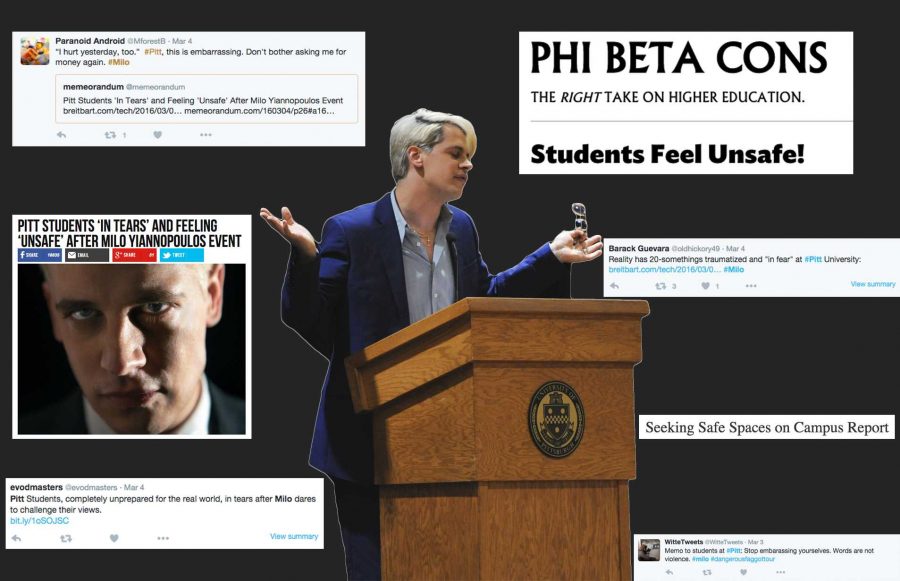At this point, most of us know the name Milo Yiannopoulos.
Two weeks ago, Pitt College Republicans hosted a lecture by Yiannopoulos, a men’s rights activist known for controversial remarks that often earn hateful, racist, sexist and homophobic labels from activists and has inspired demonstrations at campuses across the country.
At Pitt, I was among the protesters demonstrating at his lecture.
I’ve never seen something rile Pitt’s student body like Yiannopoulos’ speech. Since then, students have shared their trauma, expressing how this event left them feeling unsafe both online and on campus. And people who don’t even go here had a lot to — wrongly — say about the student response.
Things seem to have died down here, with Vice Provost and Dean of Students Kenyon Bonner writing a letter about tolerance that appeared in Monday’s edition of The Pitt News that had an air of finality. But the Pitt community was not the only one dissecting Yiannopoulos’s speech and its aftermath.
Over the past week, several conservative outlets, such as Breitbart, where Yiannopoulos works as technology editor, and National Review, have jumped on the news.
For the most part, the coverage of the event mirrors the content of Yiannopoulos’ Pitt speech — full of misinformation and insults. The focus of the coverage illustrates just how little conservative media understands or cares about the complaints students are actually making.
Clearly, minimizing opposition concerns to feed free speech narratives is easier than confronting them.
Conservative pundits, including Yiannopoulos, argue that as the event was non-compulsory, students have no right to be offended. They argue that if you didn’t want to be offended, you shouldn’t have shown up.
This argument completely misses the point.
The fact that this event was optional in no way changes its effect on our campus. People didn’t show up “to be offended” — students showed up to defend their views, listen to a speaker they agreed with or hear a case for free speech.
These are all things students should be able to do without being attacked, no matter who they are. Students should have the option to attend this event without feeling marginalized, even if they knew they might disagree with the content.
Instead they were insulted, regardless of whether they were protestors or regular attendees, for feeling hurt. Conservative sites and social media framed those who spoke about their emotions as weaklings, despite having the courage to discuss their reactions following the event.
It would be one thing if critics only targeted protestors, but anyone at all who felt bothered by Yiannopoulos came under attack.
“Modern Liberalism is a mental disorder. These ppl are literally mentally ill. Simply astonishing,” Twitter user @Robert2Paulson wrote.
Pittsburgh radio host Hutch Bailie Jr. called upset students “Embarrassing little Marxists” and tweeted simply, “Man the hell up.”
Students are worried about their safety, not being challenged on their views. College is entirely structured around defending ideas. Writing students off as incapable of handling alternative perspectives is patronizing and counterproductive.
What most students have less experience facing, and what they should have never have to face, is hate speech. Characterizing people upset by the speech as opponents of free speech in general misrepresents their arguments. Worse, it paints all speech as equally valuable to social debate, potentially normalizing hateful rhetoric.
Hate speech, as defined by the American Bar Association, is speech that offends, threatens or insults groups based on race, color, religion, ethnicity, sexual orientation, disability or other traits. If this sounds familiar, that’s because it constituted the vast majority of Yiannopoulos’ event, from his attacks on women, queer women and people of color.
Yes, I am offended that Yiannopoulos attacked my identity as a queer woman. I am shocked that he said racist things about my fellow students, and I am hurt that he said ridiculous, terrible things about sexual assault survivors. Much more than that, I am worried and conscious of the physical and psychological effects words can have on people.
Yiannopoulos reinforces the false assumption that everyone is already treated equally. But this misconception brushes off systemic discrimination and stirs anger toward marginalized groups for speaking up for themselves.
As students, we are worried about the mental and physical safety and well-being of our friends and peers. Whether or not we attended the event, this man still preached hate speech on campus with potentially dangerous repercussions.
In a post about Pitt’s student response, Charlie Nash of Breitbart wrote, “Pittsburgh may be the steel city, but it appears its students are made of softer stuff.”
But we have not, as the conservative coverage claims, gone soft. While these sites highlight only that students are “in tears over the fact that someone … disagreed with them,” we are not just upset — we are fighting back.
Yes, we are hurting, and in many ways still reeling, from the torrent of hate that Yiannopoulos released and others have encouraged on campus. But we will continue to take a stand against hate and discrimination on campus, despite its emotional toll, by showing up and asking questions until there are answers.
The conservative media outlets did get one thing right, though.
The Heritage Foundation referred to the controversy over safe spaces and Yiannopoulos’s speaking engagement as a culture war — a reasonable title.
In my eyes, we are currently at war to determine what culture is welcome at this University — a culture of inclusivity and consideration or a culture of hate and prejudice.
Media outlets can continue to frame the conflict as free speech versus political correctness, but mocking is not enough to silence us. Causing tears should lead to reflection, not victory laps.
Alyssa primarily writes on social justice and political issues for The Pitt News.
Write to her at [email protected].



